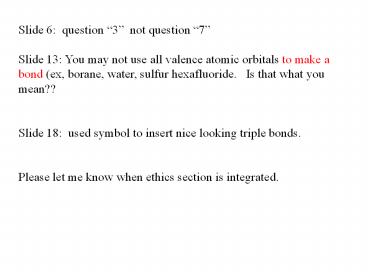Intersection 4 PowerPoint PPT Presentation
Title: Intersection 4
1
Slide 6 question 3 not question 7 Slide
13 You may not use all valence atomic orbitals
to make a bond (ex, borane, water, sulfur
hexafluoride. Is that what you mean?? Slide
18 used symbol to insert nice looking triple
bonds. Please let me know when ethics section
is integrated.
2
Intersection 4
- 9/26/06
- Reading 8.6 bond length p 348-351
- 8.10 exceptions p 363-366
3
Outline
- Concept Questions
- Lewis Structures
- Bond Length
- Ethics
4
Question 1
- Following is a list of properties of a sample of
solid sulfur - Brittle, crystalline solid.
- Melting point of 113oC.
- Density of 2.1 g/cm3.
- Combines with oxygen to form sulfur dioxide
- Which, if any, of these properties would be the
same for one single atom of sulfur obtained from
the sample? - i and ii only.
- iii and iv only.
- iv only.
- All of these properties would be the same.
- None of these properties would be the same.
5
Question 2
- Which of the following samples could be methane,
CH4? A sample that contains - (a) 25 hydrogen by weight 75 carbon by weight
- (b) 4.0 g of H atoms and 1.0 g of C atoms
- (c) 0.40 mole of H atoms and 1.0 x 1023 C atoms
- (d) 0.40 mole of H2 molecules and 0.20 moles of C
atoms
6
Question 3
- True or False? When a match burns, some matter is
destroyed. - True
- False
- What is the reason for your answer to question 3?
- This chemical reaction destroys matter.
- Matter is consumed by the flame.
- The mass of ash is less than the match it came
from. - The atoms are not destroyed, they are only
rearranged. - The match weighs less after burning.
7
(No Transcript)
8
SO4-2
9
Cyanate NCO-
- Draw the Lewis Structure
- Formal charge rules
- The smaller the better
- Negative formal charges should reside on the more
electronegative atom - Avoid like charges on adjacent atoms
10
Draw the Lewis Structures for the Following
Molecules
- BH3
- SF6
- PCl5
- NO
11
Group 3
12
Expanded Octet
An expanded octet can be achieved with atoms that
have d-orbitals in their valence shell.
13
- You must have an atomic orbital in the valence
shell for every bond that you make. - You may not use all valence atomic orbitals to
make a bond (ex, borane, water, sulfur
hexafluoride.
14
Radicals
15
(No Transcript)
16
Are all bonds the same?
17
Bond Order
- Single bond - first order
- Double bond second order
- Triple bond ? third order
18
Bond Length (pm) the distance between the
nuclei of two bonded atom
H-F 92 CC 134 C-O 143
H-Cl 127 CN 127 CO 122
H-Br 142 CO 122 CO 113
H-I 161
C-C 154
C-Si 194 C-C 154 CC 134
C-P 187 C-N 147 CC 121
C-S 181 C-O 143
C-Cl 176 C-F 141
19
(No Transcript)
20
Ethics
- Name a situation in science where an ethical
decision must be made?
What behaviors/practices in science would you
consider unethical?
21
- List all of the ethical issues in the case of
Millikan?
- List all of the ethical issues in the case of
Schön?
How are the situations in the two cases similar?
How are they different?
Did Millikan behave ethically in reporting his
data? Why or why not?
Did Schön behave ethically in reporting his data?
Why or why not?
22
- If you were faced with a portion of your data
that "didn't fit" your hypothesis what would your
options be?
What are the consequences of publishing incorrect
data?
23
Mark and Jerry
- List the ethical issues in this case
What are the consequences of reporting the data?
What are the consequences of NOT reporting the
data?
Does the fact that Jerry Elrod tells Mark that
anything under 5 unfavorable results is
insignificant relieve Mark of any further
responsibility?
If Mark wonders whether Jerry's 5 standard for
reporting data meets regulatory standards of
acceptability, how might he go about finding out?
24
- Under what conditions, if any, do you think it is
ethical for scientists not to report all data in
cases related to pollution?
25
(No Transcript)

